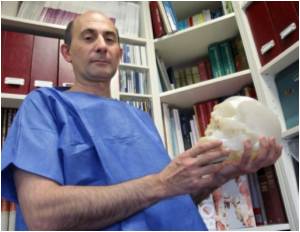- The first ever “whole body” transplant to take place soon.
- The donor will be brain dead with a functioning body, and the recipient will have an active brain with a paralyzed body.
- The procedure will involve fitting the donor’s body to the recipient’s head and sealing the spinal cord with polypropylene glycol.
The human head transplant project, known formally as the “Human Head Anastomosis Venture” (HEAVEN)
- The body of the recipient is cooled down to 15 degrees Celsius
- The head of the recipient and the donor are severed at the same time using a nano-sharp razor
- The body of the recipient is taken and attached to the donor’s body after aligning it with a special dolly and chair
- The spinal cord is joined using a special glue called polypropylene glycol, a compound used to fuse fatty cell membranes, and that can repair any tissue damage that occurs to the transected spinal cord
- The patient is put in medically-induced coma for three weeks
- During this period, the muscles and blood vessels are stitched together and given time to heal
- Meanwhile, small electric shocks are delivered to stimulate the spinal cord and to strengthen the connection between the head and the new body
- Hopefully, when the patient is brought out of coma, he/she will be able to move, feel their face, and even speak with the same voice!
Risks and uncertainties of the transplant procedure
Five questions that have risen against the whole process of head transplantation are- Is it possible to reconnect the spinal cord of one person to another? Will such a procedure be anatomically and physiologically successful?
There is a procedure called the GEMINI Spinal Fusion that has had success in restoring motor activity in mice. But apart from motor functions, the body also needs to restore sensory and autonomic functions, and this point is yet to be seen. - Immunosuppressants have to be used after any organ transplant operation, to prevent the body from rejecting the new organ. The head constitutes only 8% of the whole body weight, and hence there are high chances of the head being rejected by the body. To prevent this, the procedure has to involve a strategy that is already being used in face and limb transplants. This involves transferring myeloid cells from the recipient to the donor’s bone marrow and allowing chimerization to obviate the rejection process.
- The recipient would need psychological screening and support after such an operation, as it would be difficult for the recipient’s mind to accept a foreign body as his own. In fact, some critics warn that the dissonance between the mind and body could be of such a magnitude that insanity and death are possibilities. Apart from the brain that controls the body's activities there is also an entire “second brain” present as the enteric nervous system (ENS) in the gut which is theorized to function independent of the brain. The ENS is responsible for churning out around 30 neurotransmitters or brain hormones, including 95% of serotonin, the primary mood hormone that controls emotions. A whole body transplant could cause desynchronisation between the two nervous systems.
- Since the head only constitutes 8% of the whole body weight, there will be ethical questions about who the final body will represent. Answers to several questions will be inconclusive. For example, how will a left-handed brain be compatible with a right-handed body, and if the head belongs to one person and the fingerprints belong to another what will be the identity of the new person.
- Finally, the whole procedure costs around 10 million dollars. Is it fair to donate an entire body to one person, just because he is financially able? Or should the person donate different organs to different people so that many may be benefitted?
"Meanwhile, Arthur L. Caplan, head of the division of medical ethics at the New York University School of Medicine has questioned the authenticity of the whole operation in his article in the Chicago Tribune.
Is a head transplant operation indeed going to take place? If Canavero's team does perform the operation, what will be the possible outcome of such a procedure? We have to wait and watch."
References:
- Head Transplantation : Will ' HEAVEN' fall ? - (https://health.economictimes.indiatimes.com/news/industry/head-transplantation-will-heaven-fall-/62626770)














